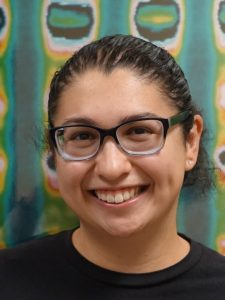Congratulations to Jasmine Cubuk for being selected for the 2022 John E. Majors Fellowship Award
 Jasmine is a recent graduate in the Biochemistry, Biophysics, and Structural Biology (BBSB) program. She defended on April 21st, 2023. She did her PhD thesis work in the lab of Dr. Andrea Soranno, where she studied how sequence composition of intrinsically disordered regions within a protein can affect interactions with both proteins and nucleic acids using single-molecule fluorescence spectroscopy.
Jasmine is a recent graduate in the Biochemistry, Biophysics, and Structural Biology (BBSB) program. She defended on April 21st, 2023. She did her PhD thesis work in the lab of Dr. Andrea Soranno, where she studied how sequence composition of intrinsically disordered regions within a protein can affect interactions with both proteins and nucleic acids using single-molecule fluorescence spectroscopy.
Jasmine joined the BBSB program after receiving her B.S. from Stockton University in Galloway, New Jersey with a major in biochemistry & molecular biology and a minor in holistic health. Prior to starting her Ph.D. work, Jasmine studied polymer synthesis and how polymer interactions contribute to optimized hydrogel formation.
Since joining the lab of Dr. Andrea Soranno, Assistant Professor in the Biochemistry and Molecular Biophysics department, Jasmine has studied the role that intrinsically disordered sequences play in recruiting nucleic acids to proteins that functionally interact with RNA. Her research centers on understanding the role of positively charged disordered regions in the interaction with RNA. To this end, she uses a combination of single-molecule fluorescence approaches that can capture the structural ensemble of the disordered regions and the extent of the protein-protein and protein-RNA interactions. Intrigued by the serine-arginine enrichment in one of its disordered regions, Jasmine has recently tackled the investigation of the SARS-CoV-2 Nucleocapsid protein. This protein is responsible for the condensation of the viral genome within the SARS-CoV-2 virus. Applying single-molecule Foerster Resonance Energy Transfer, Jasmine has determined how the different disordered and folded domains of the protein respond to changes in solvent conditions. The combination of these results with atomistic simulations (in collaboration with the Holehouse group) provides a detailed conformational description of the protein. The same approach has been extended for studying oligomerization and the mode of interaction with nucleic acids. The emerging picture is of a protein where disordered regions contribute to multivalence and modulate its ability to condensate single and multiple RNA molecules.
Jasmine is currently a Postdoc in Andrea Soranno’s lab.
